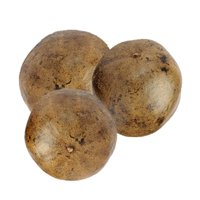 Full List of Fruits
Full List of Fruits  Arhat fruit
Arhat fruitArhat fruit
Scientific name - Siraitia grosvenorii
Momordica fruit is famously called as Arhat. It is one of the rare fruits that cannot be consumed until it is dried.
Araza fruit is a small, yellow-orange berry native to the Amazon rainforest. It is a member of the Sapindaceae family and is related to the lychee and mamoncillo fruits. The araza is native to the tropical regions of South America, mainly in Peru, Brazil, Ecuador, and Colombia.
The araza fruit has a unique flavor and aroma that is a combination of sweet and tart. The flesh is soft and juicy, and the taste has hints of pineapple, passion fruit, and guava. It is a great source of vitamins and minerals such as vitamin C, potassium, and calcium.
Araza fruit can be eaten raw and makes a delicious snack. It can also be used in smoothies, salads, jams, jellies, and other recipes. It is full of antioxidants and has anti-inflammatory properties, which makes it a great addition to a healthy diet.
The araza fruit is popular in the Amazon rainforest and is often sold in markets and roadside stands. It is available in dried form, as well as in juices and other products. It is also used in traditional Amazonian medicine to treat digestive issues and skin conditions.
![]() Nutritional Value of Arhat fruit
Nutritional Value of Arhat fruit
| Principle | Nutrient Value | Percentage of RDA |
|---|---|---|
| Energy | 70 Kcal | 3.5% |
| Carbohydrates | 17 g | 13% |
| Protein | 0.5g | 1% |
| Total Fat | 0.27 g | 1% |
| Cholesterol | 0 mg | 0% |
| Dietary Fiber | 1.80 g | 4.5% |
| Vitamins | ||
| Folates | 14 �g | 3.5% |
| Niacin | 0.584 mg | 3.5% |
| Pantothenic acid | 0.160 mg | 1% |
| Pyridoxine | 0.134 mg | 10% |
| Riboflavin | 0.057 mg | 4% |
| Thiamin | 0.058 mg | 5% |
| Vitamin A | 765 IU | 25.5% |
| Vitamin C | 27.7 mg | 46% |
| Vitamin E | 1.12 mg | 7.5% |
| Vitamin K | 4.2 �g | 3.5% |
| Electrolytes | ||
| Sodium | 2 mg | 0% |
| Potassium | 156 mg | 3% |
| Minerals | ||
| Calcium | 10 mg | 1% |
| Copper | 0.110 mg | 12% |
| Iron | 0.13 mg | 1.5% |
| Magnesium | 9 mg | 2% |
| Manganese | 0.027 mg | 1% |
| Zinc | 0.04 mg | 0% |
| Phyto-nutrients | ||
| Carotene-� | 445 �g | -- |
| Carotene-a | 17 �g | -- |
| Crypto-xanthin-� | 11 �g | -- |
| Lutein-zeaxanthin | 0 �g | -- |
| Lycopene | 0 �g | -- |
This fruit belongs to southern China and Northen Thailand. This fruit is round in structure. Its smooth texture also adds to its beauty. It can be either yellowish brown or greenish brown. The pulp of this fruit is sweet and edible. This fruit is said to provide lot of health benefitsiand is named after some Buddhist monks. These species belong to the family of gourds.
Also called as the Monk fruit or Buddha fruit, the entire fruit has sweetness attached to it so much so that they are considered 300 times sweeter than normal sugar. It is also sometimes used for sweetening tea.
The Chinese believe that this fruit gives longevity to life if they consume it in a prolonged manner.
The Araza fruit has a number of health benefits. It's known to help boost the immune system and improve digestion. It's also believed to help reduce inflammation, protect against heart disease, and reduce the risk of cancer.
The Araza fruit can also be used as a natural dye. Its juice can be used to make fabrics, soaps, and cosmetics. Its leaves, when dried and powdered, can be used as a natural food coloring.
The Araza fruit is easy to grow and can be propagated from cuttings. It can be grown in containers or in the ground, and it prefers a warm, sunny climate. It can be harvested when the fruits are ripe, usually in late summer or early fall.
The Araza fruit is an excellent source of nutrition and can be used in a variety of ways. It's a great addition to any diet and can be enjoyed fresh or in various recipes.
Araza fruits are propagated by seed, as well as by cuttings. The seeds are usually collected from the wild and then planted in a nursery where they can be protected from the elements. Once the seedlings reach a certain size, they can be transplanted to the desired location. Cuttings from established trees can also be made and planted in the desired location.
Araza fruits need plenty of water and sunshine to thrive, so they are best grown in areas with high humidity and plenty of sunlight. The soil should be well-drained and slightly acidic, with adequate levels of potassium and phosphorus. Araza fruits also require regular pruning and fertilization to ensure healthy growth and a good yield.
Araza fruits are harvested when they are ripe, usually in the summer months. The fruits can be eaten fresh or used to make jams and juices. The seeds can also be harvested and used to propagate new trees.
Araza fruits are an important food source in parts of the Amazon, and they are becoming increasingly popular in other parts of the world. They are a nutritious and delicious fruit, and their ability to be propagated easily makes them an attractive option for commercial production.





















